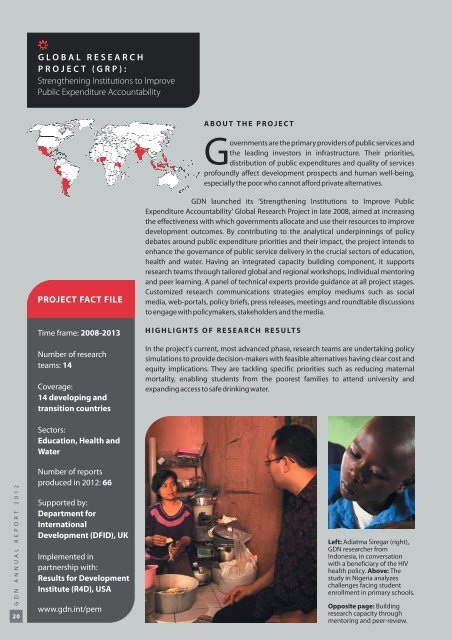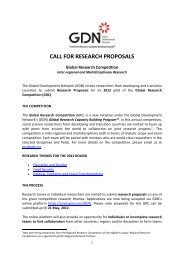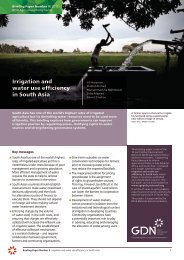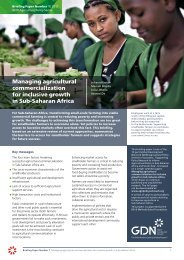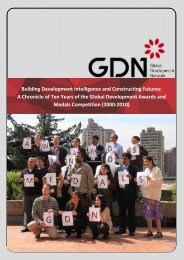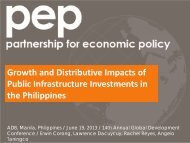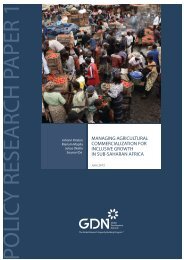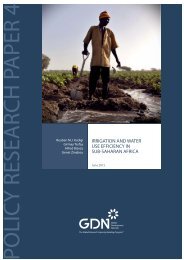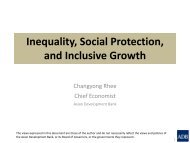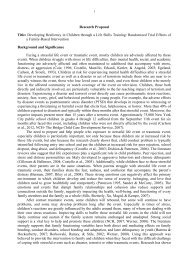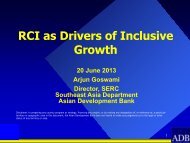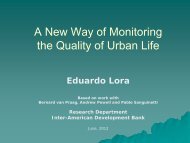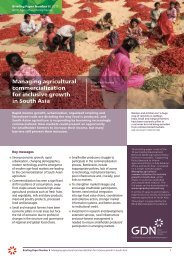ANNUAL REPORT - Global Development Network
ANNUAL REPORT - Global Development Network
ANNUAL REPORT - Global Development Network
Create successful ePaper yourself
Turn your PDF publications into a flip-book with our unique Google optimized e-Paper software.
GLOBAL RESEARCH<br />
PROJECT (GRP):<br />
Strengthening Institutions to Improve<br />
Public Expenditure Accountability<br />
ABOUT THE PROJECT<br />
Governments are the primary providers of public services and<br />
the leading investors in infrastructure. Their priorities,<br />
distribution of public expenditures and quality of services<br />
profoundly affect development prospects and human well-being,<br />
especially the poor who cannot afford private alternatives.<br />
PROJECT FACT FILE<br />
Time frame: 2008-2013<br />
Number of research<br />
teams: 14<br />
Coverage:<br />
14 developing and<br />
transition countries<br />
GDN launched its ‘Strengthening Institutions to Improve Public<br />
Expenditure Accountability’ <strong>Global</strong> Research Project in late 2008, aimed at increasing<br />
the effectiveness with which governments allocate and use their resources to improve<br />
development outcomes. By contributing to the analytical underpinnings of policy<br />
debates around public expenditure priorities and their impact, the project intends to<br />
enhance the governance of public service delivery in the crucial sectors of education,<br />
health and water. Having an integrated capacity building component, it supports<br />
research teams through tailored global and regional workshops, individual mentoring<br />
and peer learning. A panel of technical experts provide guidance at all project stages.<br />
Customized research communications strategies employ mediums such as social<br />
media, web-portals, policy briefs, press releases, meetings and roundtable discussions<br />
to engage with policymakers, stakeholders and the media.<br />
HIGHLIGHTS OF RESEARCH RESULTS<br />
In the project's current, most advanced phase, research teams are undertaking policy<br />
simulations to provide decision-makers with feasible alternatives having clear cost and<br />
equity implications. They are tackling specific priorities such as reducing maternal<br />
mortality, enabling students from the poorest families to attend university and<br />
expanding access to safe drinking water.<br />
Sectors:<br />
Education, Health and<br />
Water<br />
GDN <strong>ANNUAL</strong> <strong>REPORT</strong> 2012<br />
20<br />
Number of reports<br />
produced in 2012: 66<br />
Supported by:<br />
Department for<br />
International<br />
<strong>Development</strong> (DFID), UK<br />
Implemented in<br />
partnership with:<br />
Results for <strong>Development</strong><br />
Institute (R4D), USA<br />
www.gdn.int/pem<br />
Left: Adiatma Siregar (right),<br />
GDN researcher from<br />
Indonesia, in conversation<br />
with a beneficiary of the HIV<br />
health policy. Above: The<br />
study in Nigeria analyzes<br />
challenges facing student<br />
enrollment in primary schools.<br />
Opposite page: Building<br />
research capacity through<br />
mentoring and peer-review.


